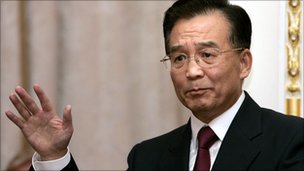 Chinese Premier Wen Jiabao has once again said China needs to carry out political reforms.
Chinese Premier Wen Jiabao has once again said China needs to carry out political reforms.
He said the economic achievements of the last 30 years could be lost without "institutional" changes.
The premier did not spell out exactly what reforms are necessary - and said they would have to be introduced gradually.
But his comments appear to put him out of step with more conservative colleagues.
More democracy?
Mr Wen made his comments at an annual press conference held at the end of China's annual parliamentary session in Beijing.
When asked about political reform, he could have easily ducked the question.
But he said: "Without political restructuring, economic restructuring will not succeed and the achievements we have made in economic restructuring may be lost."
That seems to put him at odds with another senior leader, Wu Bangguo, who only last week ruled out the possibility of major political changes.
In a speech to the parliament, Mr Wu said the economic achievements of the last few decades would, on the contrary, be lost if the system was changed too much.
There is though perhaps not as much distance between the two men as would first appear.
Chinese leaders often talk about making their political system more "democratic" and introducing reforms.
Most of the time they mean they want to improve the efficiency of the current system and make it more responsive to people's demands.
Mr Wen added that change would have to come step by step - and under the leadership of the Chinese Communist Party, which has ruled China for more than 60 years.
He also said that there were no parallels between China and the countries of the Middle East and North Africa, countries that are currently going through political upheavals.
But Mr Wen - who has made similar comments before - did seem to go further than he needed to go.
People can currently vote for their own village leaders in China. The premier held out the possibility that direct elections could be extended beyond this limited level.
"If we are to address the people's grievances we must allow the people to supervise and criticise the government," he said.
With little known publicly about how Chinese leaders reach decisions - or what their real opinions might be - it is difficult to assess the importance of Mr Wen's words, or where they might lead.
Perhaps nowhere. The premier is due to retire in two years' time; he might already have one eye on his legacy.



